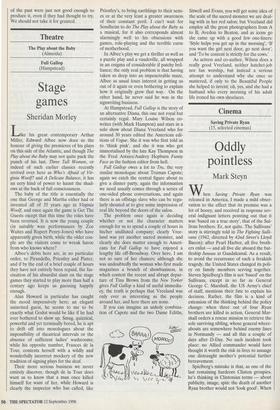Theatre
The Play about the Baby (Almeida) Full Gallop (Hampstead)
Stage games
Sheridan Morley
Lk' e his great contemporary Arthur Miller, Edward Albee now does us the honour of giving the premieres of his plays on this side of the Atlantic, and though The Play about the Baby may not quite pack the punch of his last, Three Tall Women, or indeed of such earlier classics recently revived over here as Who's Afraid of Vir- ginia Woolf? and A Delicate Balance, it has an eery kind of power to haunt the shad- ows at the back of full consciousness.
The baby of the title is essentially the one that George and Martha either had or invented all of 35 years ago in Virginia Woolf, and once again the game is Get The Guests except that this time the roles have been reversed. It is now the young couple (in suitably wan performances by Zoe Waites and Rupert Penry-Jones) who have apparently given birth, while the older cou- ple are the visitors come to wreak havoc from who knows where?
Albee's debts here are, in no particular order, to Pirandello, Priestley and Pinter, and if by the end of a brief couple of hours they have not entirely been repaid, the fas- cination of his absurdist slant on the stage games they started to play more than half a century ago keeps us guessing happily enough.
Alan Howard in particular has caught the mood impressively here; an elegant uninvited guest, he seems to me to be exactly what Godot would be like if he had ever bothered to show up. Smug, quizzical, powerful and yet terminally bored, he is apt to drift off into monologues about the impossibility of theatrical intervals or the absence of sufficient ladies' washrooms; while his opposite number, Frances de la Tour, contents herself with a wildly and wonderfully incorrect mockery of the new tradition of signing plays for the deaf.
Their more serious business we never entirely discover, though de la Tour does want us to know that a man once killed himself for want of her, while Howard is clearly the inspector who has called, like Priestley's, to bring earthlings to their sens- es or at the very least a greater awareness of their constant peril. I can't wait for Sondheim to do The Play about the Baby as a musical, for it also corresponds almost alarmingly well to his obsessions with games, role-playing and the terrible curse of motherhood.
In Albee's play we get a thriller as well as a puzzle play and a vaudeville, all wrapped in an enigma of considerable if patchy bril- liance; the only real problem is that having taken us deep into an impenetrable maze, Albee as usual loses interest in getting us out of it again or even bothering to explain how it originally grew that way. On the other hand, he never said he was in the signwriting business.
At Hampstead, Full Gallop is the story of an alternative Diana, this one not royal but certainly regal. Mary Louise Wilson co- writes (with Mark Hampton) and stars in a solo show about Diana Vreeland who for around 30 years edited the American edi- tions of Vogue. She it was who first told us to 'think pink', and she it was who got immortalised by the late Kay Thompson in the Fred Astaire/Audrey Hepburn Funny Face as the fashion editor from hell.
Full Gallop owes a lot to Tru, the very similar monologue about Truman Capote; again we catch the central figure about to give a dinner party, again the information we need usually comes through a series of one-sided phone conversations, and again there is an offstage slave who can be regu- larly shouted at to give some impression of real life beyond the doors of the salon.
The problem once again is deciding whether or not the character matters enough for us to spend a couple of hours in his/her undiluted company; clearly Vree- land was yet another sacred monster, and clearly she does matter enough to Ameri- cans for Full Gallop to have enjoyed a lengthy life off-Broadway. Over here, I am not so sure of her chances; although she was undoubtedly the woman who first made magazines a branch of showbusiness, in which context the recent and abrupt depar- ture of Tina Brown from the New Yorker gives Full Gallop a kind of useful immedia- cy, the truth is perhaps that Vreeland was only ever as interesting as the people around her, and here there are none.
If you can imagine an unholy combina- tion of Capote and the two Dame Ediths, Sitwell and Evans, you will get some idea of the scale of the sacred monster we are deal- ing with in her red salon; but Vreeland did employ all the great photographers from A to B, Avedon to Beaton, and as icons go she came up with a good few one-liners: 'Style helps you get up in the morning', 'If you want the girl next door, go next door', and 'To be content is strictly for the cows.'
As actress and co-author, Wilson does a really good Vreeland, neither hatchet-job nor fan worship, but instead a serious attempt to understand why she once so mattered, if only to the Beautiful People she helped to invent; oh, yes, and she had a husband who every morning of his adult life ironed his own shoelaces.


































































 Previous page
Previous page